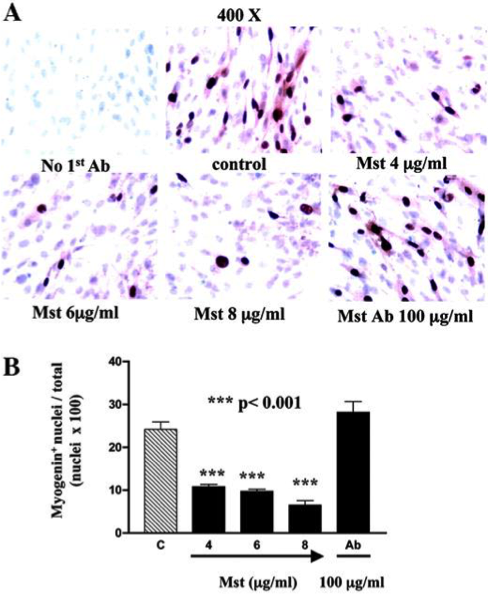Cat. #153655
Anti-Myostatin [Myo2/1A]
Cat. #: 153655
Sub-type: Primary antibody
Unit size: 100 ug
Availability: 10-12 weeks
Target: Myostatin
Class: Monoclonal
Application: WB
Reactivity: Human
Host: Mouse
£300.00
This fee is applicable only for non-profit organisations. If you are a for-profit organisation or a researcher working on commercially-sponsored academic research, you will need to contact our licensing team for a commercial use license.
Contributor
Institute: BioServ UK Ltd
Tool Details
*FOR RESEARCH USE ONLY
- Name: Anti-Myostatin [Myo2/1A]
- Alternate name: Growth/differentiation factor 8, GDF-8, myostatin, GDF8, MSTN
- Clone: Myo2/1A
- Tool sub type: Primary antibody
- Class: Monoclonal
- Purpose: Marker
- Conjugation: Unconjugated
- Molecular weight: 52 kDa
- Reactivity: Human
- Host: Mouse
- Application: WB
- Description: Myostatin is a well-characterized negative regulator of skeletal muscle and can inhibit myogenesis and stimulate adipogenesis. Clone Myo 2/1A has been shown to have the reverse effect, up-regulate myogenesis and down-regulate adipogenesis.
- Immunogen: Recognizes the 113 amino acid carboxy-terminal fragment of Myostatin protein
- Myeloma used: Sp2/0-Ag14
- Recommended controls: Muscle fibre
Target Details
- Target: Myostatin
- Molecular weight: 52 kDa
- Tissue cell line specificity: Mouse
- Target background: Myostatin is a well-characterized negative regulator of skeletal muscle and can inhibit myogenesis and stimulate adipogenesis. Clone Myo 2/1A has been shown to have the reverse effect, up-regulate myogenesis and down-regulate adipogenesis.
Applications
- Application: WB
Handling
- Format: Liquid
- Unit size: 100 ug
- Shipping conditions: Shipping at 4° C
References
- Artaza et al. 2005. Endocrinology. 146(8):3547-57. PMID: 15878958.
- Myostatin inhibits myogenesis and promotes adipogenesis in C3H 10T(1/2) mesenchymal multipotent cells.




